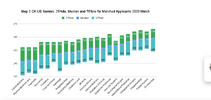OldBenKenobi
New Member
- Joined
- Aug 28, 2023
- Messages
- 1
- Reaction score
- 0
Hey all,
New to posting (not browsing) here. I am an M4 at a mid-level school who just received my Step 2 score of a 255 last week. I just don't know how to gauge my competitiveness for orthopedics in this upcoming cycle. So I'm hoping for some honest feedback.
For context, I have had my sights set on ortho since early M1. I will finish in the top MSPE percentile bracket possible for my class after honoring all of M1 and M2 with 4/8 Honors in clinicals including surgery (the rest were HP with one Pass in Family). I was also fortunate to recently receive AOA. My research experience is decent with around 20 total publications (4-5 manuscripts with the rest being presentations and posters). I also have several extracurriculars that I am passionate.
Currently, I am in the middle of my away rotation season featuring three ortho rotations at good programs. I felt really solid about my application prior to Step 2 and while I underperformed by a fair margin from my practice tests, I am proud of the work I put in. Nevertheless, at slightly below the average matched score of 256 from last year and with the change to Step 1 P/F shifting all the focus to this exam I am very worried this year might be a whole new ball game. (It certainly seems like everyone I am hearing from interested in ortho got a 260+ but hopefully this is just reporting bias.)
Any input regarding my competitiveness or anticipated changes in scores this year would be greatly appreciated as I am now contemplating also applying to general surgery prelim years/research years (but obviously ERAS is drawing near so these options would require a lot of immediate effort).
TLDR: Got a 255, applying ortho (last year's average was 256). How concerned should I be about my score this cycle? And should it impact my signaling strategy (+/- dual applying)?
Thanks everyone
New to posting (not browsing) here. I am an M4 at a mid-level school who just received my Step 2 score of a 255 last week. I just don't know how to gauge my competitiveness for orthopedics in this upcoming cycle. So I'm hoping for some honest feedback.
For context, I have had my sights set on ortho since early M1. I will finish in the top MSPE percentile bracket possible for my class after honoring all of M1 and M2 with 4/8 Honors in clinicals including surgery (the rest were HP with one Pass in Family). I was also fortunate to recently receive AOA. My research experience is decent with around 20 total publications (4-5 manuscripts with the rest being presentations and posters). I also have several extracurriculars that I am passionate.
Currently, I am in the middle of my away rotation season featuring three ortho rotations at good programs. I felt really solid about my application prior to Step 2 and while I underperformed by a fair margin from my practice tests, I am proud of the work I put in. Nevertheless, at slightly below the average matched score of 256 from last year and with the change to Step 1 P/F shifting all the focus to this exam I am very worried this year might be a whole new ball game. (It certainly seems like everyone I am hearing from interested in ortho got a 260+ but hopefully this is just reporting bias.)
Any input regarding my competitiveness or anticipated changes in scores this year would be greatly appreciated as I am now contemplating also applying to general surgery prelim years/research years (but obviously ERAS is drawing near so these options would require a lot of immediate effort).
TLDR: Got a 255, applying ortho (last year's average was 256). How concerned should I be about my score this cycle? And should it impact my signaling strategy (+/- dual applying)?
Thanks everyone
Last edited:

